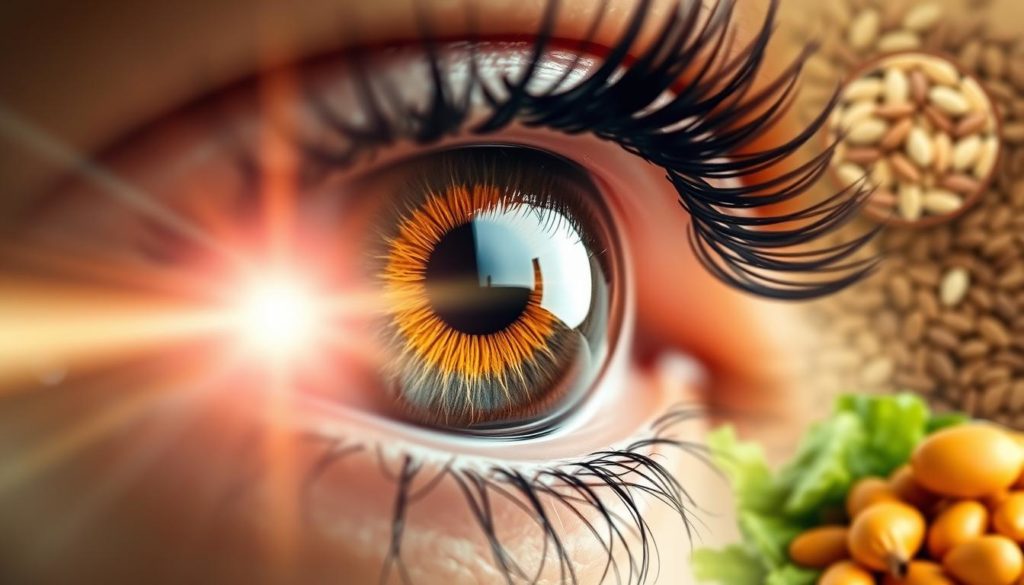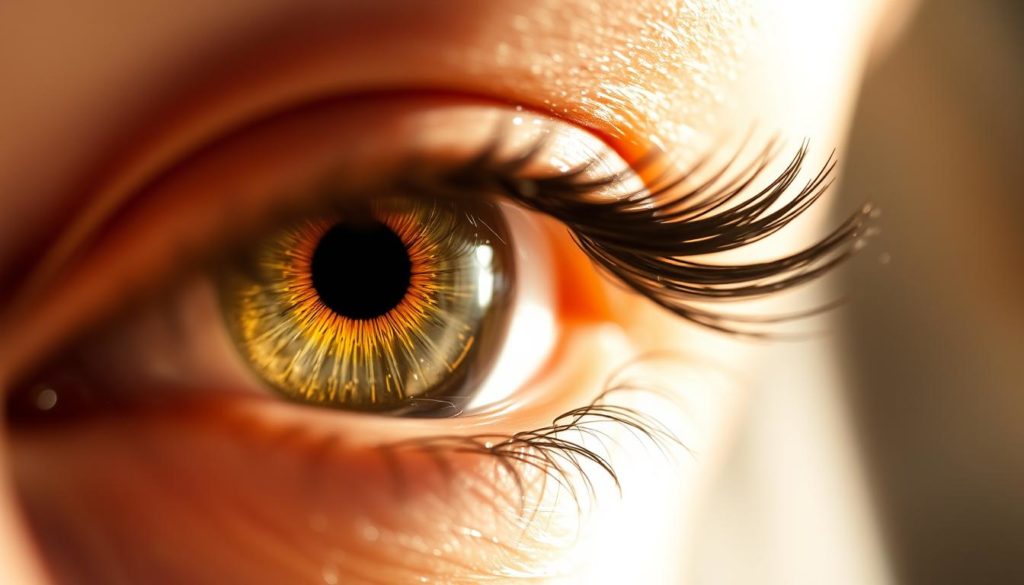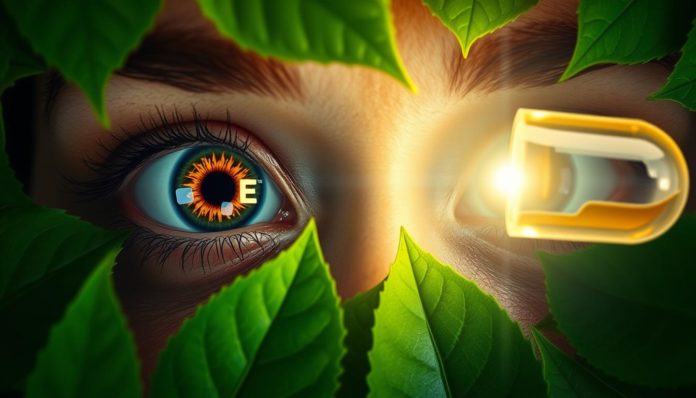About 11 million people in the U.S. have age-related macular degeneration (AMD). This shows how important eye health is. Vitamin E is a key nutrient that helps protect your eyes. It fights oxidative damage and may slow down AMD and cataracts.
The Age-Related Eye Disease Study (AREDS) found Vitamin E can help improve eyesight. It protects your eyes from UV rays and boosts eye health.
Want to know more? Keep reading to learn how Vitamin E can make your vision better and keep your eyes safe.
Understanding Vitamin E and Its Importance
Vitamin E is a key nutrient known for its strong antioxidant effects. It plays a big role in keeping our vision healthy. Let’s explore how it works to protect our eyes.
What is Vitamin E?
Vitamin E is more than one thing; it’s a group of eight fat-soluble compounds. These include tocopherols and tocotrienols. It’s vital for many body functions, especially for eye health because it shields cells from harm.
Types of Vitamin E
There are two main types of Vitamin E: tocopherols and tocotrienols. Each type has different forms like alpha, beta, gamma, and delta. The role of Vitamin E in vision health is mostly linked to alpha-tocopherol.
Alpha-Tocopherol: The Key Form
Alpha-tocopherol is the most active form of Vitamin E in humans. It’s key when talking about Vitamin E and eye health. This form fights off free radicals and guards the eyes’ delicate cells, boosting vision health.

Vitamin E for Vision: An Overview
Vitamin E is key for keeping our eyes healthy as we get older. It fights oxidative stress, which can lead to eye diseases like age-related macular degeneration (AMD) and cataracts.

Studies show that Vitamin E stops free radicals, protecting eye cells. This is very important for older people. Oxidative stress can make AMD and cataracts worse.
Vitamin E is often linked with eye diseases because it may help prevent or slow them. Alpha-tocopherol, a type of Vitamin E, can reduce cataract risk and slow AMD.
Here is a detailed look at the impact of Vitamin E on vision:
| Key Aspect | Impact of Vitamin E |
|---|---|
| Oxidative Stress Reduction | Helps neutralize free radicals, protecting eye cells |
| Age-Related Macular Degeneration | Slows down progression through antioxidant properties |
| Cataract Formation | Reduces risk and progression due to alpha-tocopherol |
| Overall Visual Acuity | Maintains clarity of vision by preventing cell damage |
Adding Vitamin E to your diet can greatly benefit your eye health, especially against age-related problems. Whether from food or supplements, getting enough Vitamin E is smart for keeping your vision clear and protecting against eye diseases.
How Vitamin E Improves Eye Health
Vitamin E is key for keeping eyes healthy. It plays a big role in protecting vision and stopping eye problems that can get worse over time.
Antioxidant Properties
The antioxidant properties of Vitamin E are great for eye health. Vitamin E fights off free radicals, which can harm eye tissues. This can lead to serious vision loss.
Protection Against Oxidative Damage
Vitamin E also protects eyes from oxidative damage. Eyes are at risk because they get a lot of light and work hard. Eating Vitamin E helps eyes stay safe from oxidation. This is key for keeping eyes healthy for a long time.
Preventing Cataracts
Studies show Vitamin E helps prevent cataracts. Cataracts happen when proteins in the lens get damaged and clump together, making vision cloudy. Vitamin E stops this from happening. So, eating foods high in Vitamin E or taking supplements can lower the chance of getting cataracts and keep vision clear.
Clinical Studies Supporting Vitamin E for Eye Health
There’s a lot of research showing how Vitamin E helps eye health. Studies have looked into how these supplements can improve vision and eye care. Let’s explore some key findings.
The Age-Related Eye Disease Study (AREDS)
The AREDS study was a big deal for Vitamin E. It showed that Vitamin E supplements could cut the risk of advanced AMD by 25%. This is for people who were already showing early signs of AMD. So, Vitamin E supplements for better vision could be really helpful for them.
Other Supporting Research
Other studies also back up Vitamin E’s benefits for eye health. For example, Vitamin E can protect the eyes from oxidative stress. This is a big factor in many eye diseases. So, Vitamin E could help keep vision sharp and prevent eye problems.
Contradictory Findings
But, not all studies agree. Some say Vitamin E’s benefits might not be as big as we thought. This means we need more research. Even so, the idea that Vitamin E supplements for better vision could be promising is still out there.
Recommended Dosage of Vitamin E for Vision
It’s important to know how much Vitamin E you should take for your eyes. Vitamin E is an antioxidant that helps protect your eyes from damage.
Recommended Daily Allowance
Experts say you should take 22.5 international units (IU) of Vitamin E daily. This amount helps protect your vision without risking too much.
Safe Upper Limits
It’s good to stick to the daily recommended amount. But, knowing the highest amount you can safely take is also key. For Vitamin E, the highest safe amount is 1,500 IU. This limit helps prevent any negative effects.
Potential Risks of Overdosage
Vitamin E is great for your vision, but taking too much can be harmful. Taking more than the safe limit, especially with blood thinners, can raise the risk of a hemorrhagic stroke. Always talk to a doctor before starting any supplements.
| Category | Dosage |
|---|---|
| Recommended Daily Allowance | 22.5 IU |
| Safe Upper Limit | 1,500 IU |
Vitamin E Supplements for Better Vision
Keeping your eyes healthy is key to a good life. Vitamin E supplements for better vision are vital. They protect eye cells from damage with their strong antioxidant effects. Taking Vitamin E supplements can prevent eye problems like macular degeneration and cataracts.
If you can’t get enough Vitamin E from food, supplements are an option. But, it’s important to talk to a doctor before starting them. This is to avoid side effects from too much Vitamin E. A daily dose of up to 400 IU is usually safe for eye health.
Taking too much Vitamin E can cause problems like issues with blood clotting. So, knowing the right amount to take is crucial. You can learn more about safe doses and risks from trusted sources.
Adding Vitamin E supplements for better vision to your routine could help keep your eyes healthy. Whether from food or supplements, keeping Vitamin E levels up is good for your eyes in the long run.
Foods Rich in Vitamin E
Vitamin E is key for keeping your eyes healthy. Eating foods high in Vitamin E can boost your eye health. Foods like nuts and seeds, veggies, and fortified foods are great sources of this nutrient. Let’s look at some top choices in these groups.
Nuts and Seeds
Nuts and seeds are packed with Vitamin E. Here are some foods you should add to your meals:
- Almonds
- Sunflower seeds
- Hazelnuts
Vegetables
Some veggies are also great for Vitamin E. Here are the best ones:
- Spinach
- Sweet potatoes
- Avocados
Fortified Foods
Fortified foods make getting Vitamin E easy. Here are some top choices:
- Cereals
- Plant-based milk
- Margarine
| Food | Vitamin E Content (per serving) |
|---|---|
| Almonds | 7.3 mg |
| Sunflower Seeds | 7.4 mg |
| Spinach | 0.6 mg |
| Fortified Cereal | 6 mg |
Adding these Vitamin E-rich foods to your daily meals is tasty and good for your eyes.
Vitamin E and Age-Related Eye Diseases
As we get older, keeping our eyes healthy is key, especially to stop diseases that can hurt our vision. Vitamin E is getting attention for its possible role in fighting age-related eye diseases.
Macular Degeneration
Macular degeneration is a big cause of vision loss in older people. Studies show that Vitamin E, especially alpha-tocopherol, can slow down this condition. It fights free radicals to keep retinal cells healthy, which are important for clear vision.
Cataracts
Cataracts make the eye’s lens cloudy, leading to blurry vision and even blindness if not treated. Vitamin E’s antioxidants can lower the risk of getting cataracts. Taking enough Vitamin E can protect against cataracts by shielding lens proteins from damage.
Other Age-Related Conditions
Vitamin E might also help with other eye problems that come with age. Research is still going on, but early findings suggest it could be good for eye health. It might even help prevent glaucoma and other eye degenerative conditions.
How to Incorporate Vitamin E in Your Diet
Getting enough Vitamin E is key for good eye health. Vitamin E is vital for your eyes, and adding it to your diet is easy with smart choices. We’ll give you tips on meals, snacks, and supplements to boost your Vitamin E levels.
Daily Meal Suggestions
Begin your day with a Vitamin E-rich breakfast. Try whole-grain cereals or a smoothie with spinach, avocados, and nuts. For lunch and dinner, choose salads with mixed greens and add sunflower seeds, almonds, or wheat germ oil. These simple changes can greatly increase your Vitamin E intake.
Healthy Snacking Tips
For snacks, pick foods high in Vitamin E. Almonds, hazelnuts, and sunflower seeds are tasty and full of nutrients good for your eyes. Keep a bag of mixed nuts handy for quick snacks. Dried apricots are also a great choice, being both tasty and high in Vitamin E.
Supplementation Guidelines
If you’re not getting enough Vitamin E from food, think about supplements. Always talk to a healthcare expert before starting supplements. They can suggest the right amount for you. Supplements should add to, not replace, a diet full of Vitamin E from natural sources.
FAQ
What is Vitamin E?
Vitamin E is a powerful antioxidant that keeps your eyes healthy. It fights oxidative damage in the eyes. This can prevent cataracts and macular degeneration.
What types of Vitamin E are there?
There are several types of Vitamin E, but alpha-tocopherol is the most important for health. It’s a strong antioxidant.
How does alpha-tocopherol benefit eye health?
Alpha-tocopherol is crucial for eye health. It reduces oxidative damage. This can protect against cataracts and age-related macular degeneration.
What are the antioxidant properties of Vitamin E?
Vitamin E’s antioxidants neutralize free radicals. This reduces oxidative stress. It protects the eye’s sensitive tissues from damage.
How does Vitamin E prevent cataracts?
Vitamin E fights oxidative damage in the eye’s lens. This can be caused by UV rays and other harmful factors. It helps prevent cataracts.
What is the AREDS study?
The AREDS study found that Vitamin E supplements can reduce the risk of advanced age-related macular degeneration by 25%. This was true for patients with early signs of the disease.
What other research supports Vitamin E for eye health?
Many studies show that eating a lot of alpha-tocopherol can lower the risk of cataracts. But, the results are not all the same. More research is needed.
Are there contradictory findings regarding Vitamin E and vision?
Yes, some studies show benefits, but others don’t agree. We need more research to know for sure how Vitamin E supplements help eye health.
What is the recommended daily allowance of Vitamin E for eye health?
You should get 22.5 international units (IU) of Vitamin E every day for your eyes.
What are the safe upper limits for Vitamin E intake?
Don’t take more than 1,500 IU of Vitamin E a day. Taking too much can increase the risk of bleeding, especially if you’re on blood thinners.
What are the potential risks of Vitamin E overdosage?
Too much Vitamin E can make bleeding more likely, especially if you’re on blood thinners. Always talk to a doctor before starting supplements.
What are the benefits of Vitamin E supplements for better vision?
Vitamin E supplements can help people at risk of eye problems. They make sure you get enough of this important nutrient for better eye health.
Which foods are rich in Vitamin E?
Foods high in Vitamin E include nuts and seeds like almonds and sunflower seeds. Also, eat vegetables like spinach and fortified cereals.
How does Vitamin E help with age-related eye diseases?
Vitamin E fights oxidative damage in the eyes. This can slow or stop age-related eye diseases like macular degeneration and cataracts.
How can I incorporate more Vitamin E into my diet?
Eat foods like nuts, seeds, and whole grains to get more Vitamin E. Snacking on almonds or sunflower seeds can also increase your intake.


